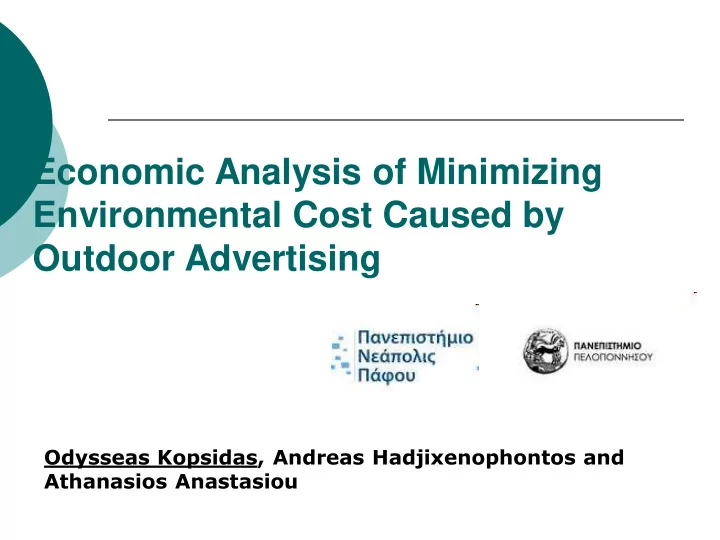

Economic Analysis of Minimizing Environmental Cost Caused by Outdoor Advertising Odysseas Kopsidas, Andreas Hadjixenophontos and Athanasios Anastasiou
Odysseas Kopsidas Economist, Lawyer, Civil Engineer, MSc Economics, PhD Economics (c).
The optimal consent ration C opt The optimal consent ration C opt of pollutant advertising in the environment can be determined as an equilibrium point in the trade off between the environmental cost due to impact on man / land / economy and the economic cost for environmental protection
Key – words environmental cost optimization advertising land
The environmental cost of outdoor advertising The economic analysis of the environmental cost of outdoor advertising in real estate involves matching the environmental to the socio - economic benefit By analogy, economic analysis of the principle / consensus ‘ think locally, act globally ’ and the (now known on a theoretical and practical basis) inverse ‘ think globally, act locally ’ .
Methodology The analysis of the subject may include qualitative and quantitative characteristics. The effort to minimize the environmental costs invoked by outdoor advertising is graphically represented by the CPM method .
CPM
Results – Discussion The minimization of environmental costs can be used as a criterion for determining the optimal value of concentration C of a pollutant in the environment that is to say, a property hosting outdoor advertising In the most common case, where socio-economic costs (KK) and private economic costs (IK) are conflicting variables the environmental cost (ΠK) which is the sum of these variables presents a single internal minimum if KK and IK, functions of C, are continuous and monotonous
Results – Discussion If the marginal socio-economic cost ( ΟΚΚ ) curves and marginal private economic cost ( ΟΙΚ ) curves are used, the optimal C opt value is easily determined from the point of intersection of the marginal cost curves.
The curves of cost
The curves of marginal cost
Results – Discussion Reducing the size of advertising may cause a shift in the cost of private finance with modern economies of scale, a reduction in the cost of privatization with the adoption of anti-pollution technology, a change in the socio-economic cost curve according to the perceptions of an environmentalist whose basic view is " the environment after all else, and a change in the socio- economic cost curve, according to the perceptions of a 'developmentist', whose basic view is first of all, after everything else. '
Conclusion In conclusion, the functionality of the methodological framework, it is developed under the form of a logical flow chart for optimizing parameter values and independent variables has been proved by using the tradeoffs between societal / environmental and private / techno economic cost and system reliability and design / construction cost.
Conclusion It is worthwhile noting that both tradeoffs, the first based on cost minimization and the second based on benefit maximization, represent interdisciplinary objective functions, since their paramaters belong to the domains of Technology, Economics and Environmental Science (which is, in its turn, a multidisciplinary field).
Thank you for your attention!
Recommend
More recommend